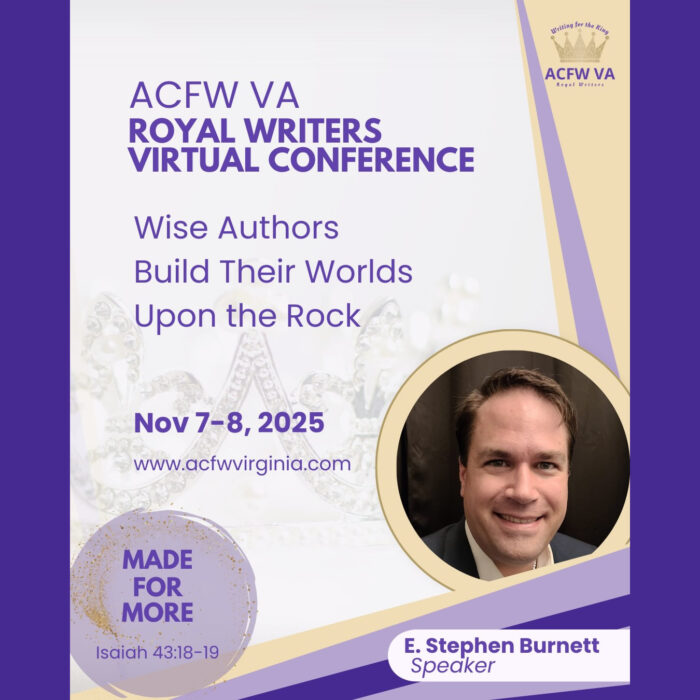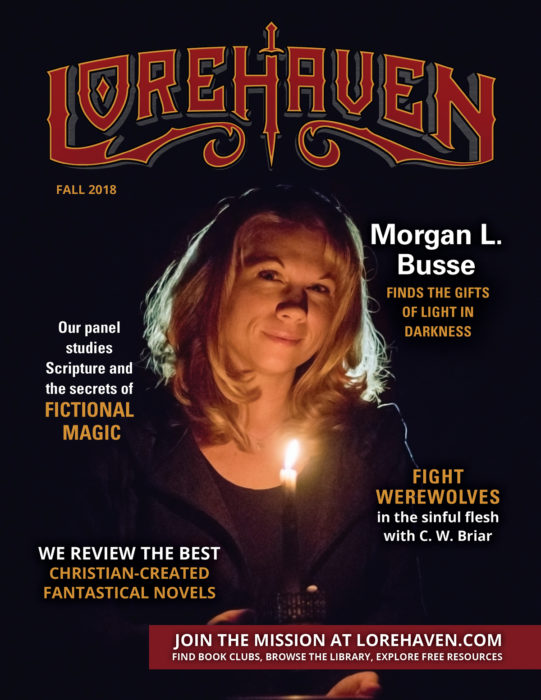Christian Fans Must Respond with Maturity to Fictional Magic
Today I’m headed to Great Homeschool Convention in Fort Worth, Texas!
Through Saturday, March 9, I’ll aid the cause of Realm Makers Bookstore. These fine folks help share Christian-made fantastic novels with new readers nationwide.
At the Realm Makers booth, we’ll offer copies of Lorehaven Magazine. (I publish Lorehaven, which debuted last year.) Here’s another excerpt from our fall 2018 issue. In this Roundtable feature, several fantasy fans and I explore a favorite topic: the beauties and risks of made-up magic in fantastical novels.
First we began with a working definition of fictional magic:
“Fictional magic is defined as a work of fiction that includes supernatural or miraculous events, or practices, that are not common to our real world. These events or practices can have different origins—such as power from a divine source, specially gifted humans, or a series of different natural laws that humans (or human-like characters) can use for different purposes.”
1. How have you, as a fan, viewed fictional magic?
I can’t remember a time of ever being tempted to sin because of fictional magic.
—Marian Jacobs
Marian Jacobs: I have always viewed and engaged with magic as merely fictional and fun. I can’t remember a time of ever being tempted to sin because of fictional magic. That said, my views have changed after I’ve met more fantasy fans who have found this tempting. Although I still think censorship of magic in literature, games, etc., is a poor solution to a heart problem, I’m a little less baffled by parents who remove all fictional magic from their home.
Robert Treskillard: As a reader and as a fan, I work hard to think of non-occultic magic in terms of an ancient way of trying to understand things that were beyond their time. As such, I try to not worry any more about it than I might new technology in a sci-fi novel. This allows me to read more broadly than I write because as an author I have my own detailed approach and opinions on the subject.
Does [a TV show or movie with magic] show the triumph of good over evil? Does it show the hero wielding magic with “honor”?
—Ronie Kendig
Ronie Kendig: My mother, wanting to honor God in all she did and the children she raised, didn’t allow us to see movies like ET or Star Wars. And I have no grudge against her for that because she sought to honor God in every aspect of her life. Now, my approach to magic systems that I read and create is that as long as I am not going against God’s word, then I am okay. For TV or movies with magic systems, I look at the source of that magic and its purpose. Does it show the triumph of good over evil? Does it show the hero wielding magic with “honor”?
Growing up, my parents made sure we didn’t do occultic things such as playing tarot cards or calling Dionne Warwick.
—Parker J. Cole
Parker J. Cole: I really didn’t start to have an opinion of magic in anyway until I got into various Christian circles. Growing up, my parents made sure we didn’t do occultic things such as playing tarot cards or calling Dionne Warwick. I knew as I watched TV and movies, I could never do the magic like in the most fabulous movie Willow. I knew I couldn’t fly on brooms or sprinkle fairy dust like Tinkerbell. Why? Because my parents told me Santa Claus wasn’t real, that we went to the Lord for any request, and that there was no such thing as magic. That’s why, when I read stories of magic, I was able to divorce any sort of reality from it.
2. How do you respond to your parents’ views of fictional magic?
Christian fans absolutely need to respond in [a] mature way . . . to the parents or other authority figures in their lives who have forbidden things from them.
—E. Stephen Burnett
ESB: Many of our readers may empathize with the memory of being taught, from childhood, that such things are either suspicious or downright evil. Ronie and Parker, you’ve both shared a very mature response to this, even if you’ve grown in your own grown-up-level approach to fictional magic. I suggest many Christian fans absolutely need to respond in this mature way, as you both have, to the parents or other authority figures in their lives who have forbidden things from them.
If we can accept that fictional magic is messy—and not all helpful or harmful—then we ought to say the same thing of parents of spiritual authority figures.
Parker: You have to come into your own relationship with Christ. My parents were just honest about it. I respect what they did teach us because it gave me a foundation in how to respond. Sure, my response has changed over the years because I’ve heard different things and can lean toward certain aspects with a bit of freedom than I could as a kid. But mom and pops were just doing the best they could with what they knew. Most parents do.
Marian: Growing up, my parents didn’t intentionally teach critical thinking about magic. I was pretty much allowed to watch anything I wanted on TV. But I was still able to glean that there is a difference between fictional magic and magic in the Bible from simple comments about Ouija boards being evil. That was enough for me to steer clear, since I wasn’t tempted by power.
My husband’s parents did censor magic in their home, and I would never say their reasons are “dumb.” They simply think it’s confusing for children and teaches them that evil magic is “fun.” I can respectfully and empathetically disagree with them.
Ronie: Crowd mentality is powerful, so I am glad for the example my mother set to measure what she did and didn’t do against the word of God. My approach to reading and watching is this: I look at the magic’s source, I look at its use in the story, and the motivations of the characters in using that system.
I only have respect for all the other parents out there even if they made different decisions than my wife and I did.
—Robert Treskillard
Robert: We really are all coming from different backgrounds. I grew up very ignorant of Christianity with about every other religion represented somewhere in my extended family. I also came from a divorced home and had little guidance on anything growing up because my mom worked and went to school. Needless to say I got into a lot of trouble and didn’t come to faith until I was fifteen. Yet here I am a now empty-nesting homeschool father who had to flip and figure out how to parent my kids in this confusing world. I only have respect for all the other parents out there even if they made different decisions than my wife and I did. We’re all just muddling through doing our best. We used to unconsciously think that if we followed the right “formula,” our kids would turn out well, but we’ve learned that there is no formula. God has us all on a bit of a wild ride and we just need to hold onto him, like Lucy holding onto Aslan’s mane.
Read the rest of this Roundtable discussion in Lorehaven Magazine’s fall 2018 issue.
You can also subscribe for free and get access to every issue. That will include the March 2019 issue out later this month.
Lorehaven serves Christian fans by finding biblical truth in fantastic stories. Book clubs, free webzines, and a web-based community offer flash reviews, articles, and news about Christian fantasy, science fiction, and other fantastical genres.













Share your thoughts, faithful reader (and stay wholesome!)